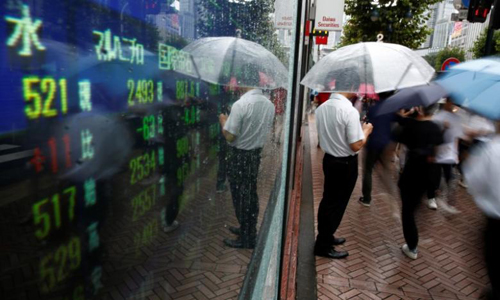Asian shares rise as US interest rates ease, China steps up yuan defence

TOKYO - Asian shares recovered to four-week highs on Friday as a surge in the dollar and its borrowing costs sparked by Donald Trump's election eased, with the US 10-year yield slipping to one-month lows.
The US dollar stayed near three-week lows against a basket of currencies though it bounced back a tad as the Chinese yuan gave up some of its massive gains made during the previous two days following Friday's midpoint fixing by China's central bank.
"The market appears to be on risk-on mode. It could be because of stabilising US yields. It could be signs of stability in Europe, or a recovery in oil. Anything that has been battered by higher US rates is coming back," Yoshinori Shigemi, global market strategist at JPMorgan Asset Management.
MSCI's gauge of the world's stock markets hit its highest levels in a year and a half, having risen 1.8 percent since the start of year, helped by this week's generally upbeat economic indicators in the US and China.
In Asia, MSCI's ex-Japan Asia-Pacific shares index rose 0.25 percent to its highest in four weeks. In contrast, Japan's Nikkei, one of the best performers since Republican Trump won the Nov. 8 election, dropped 0.4 percent as the yen gained versus the dollar. Trump's victory had sparked a major realignment in markets.
Expectations that his administration will bring tax cuts, higher spending and deregulation have boosted US bond yields and the dollar, to the detriment of many emerging economies that have benefited from cheap dollar funding and had attracted trillions of dollars from investors shunning low US yields.
"What's going on is a correction of the 'Trump trade' since the election. The markets have been trying to fully price in his policies just based on hopes," said Koichi Yoshikawa, executive director of finance at Standard Chartered Bank in Tokyo. "From now on, it's not going to be a simple one-way bet," he said.
Already under pressure from profit taking as the Trump rally wanes, the dollar extended losses on Thursday as China stepped up efforts to support the yuan, sparking speculation that it wants a firm grip on the currency ahead of Trump's Jan. 20 inauguration.
The cost of borrowing the yuan in Hong Kong, the main offshore yuan trading centre, sky-rocketed, making it too costly for speculators to sell the yuan against the dollar.
The offshore yuan gained more than 2 percent in the last two sessions, their biggest two-day gain on record, to a two-month high of 6.7833 per dollar before it eased back about 0.5 percent in Asia on Friday to 6.8208.
The dollar also slumped to a three-week low of 115.21 yen, having shed 1.6 percent on Thursday, its biggest fall in five months. It bounced back 0.4 percent on Friday to 115.80 yen.
The euro also posted its biggest gain in seven months, of 1.1 percent, on Thursday and last fetched $1.0588. The dollar's index against a basket of six major currencies tumbled to 101.30, falling more than two percent from its 14-year high of 103.82 set on Tuesday.
Investors also rushed out of their selling positions in US bonds, one of the most convincing plays since the election because Trump's policies are seen as stoking inflation. The 10-year US Treasuries yield hit a one-month low of 2.344 percent, having fallen about 30 basis points from its two-year high of 2.641 percent touched on Dec. 15.
Investors also scaled back their expectations of the Fed's rate hikes this year, with Federal Funds rate futures pricing in two rate hikes compared with two and a half at the peak in December. Markets largely shrugged off US economic data published on Thursday which was generally strong.







